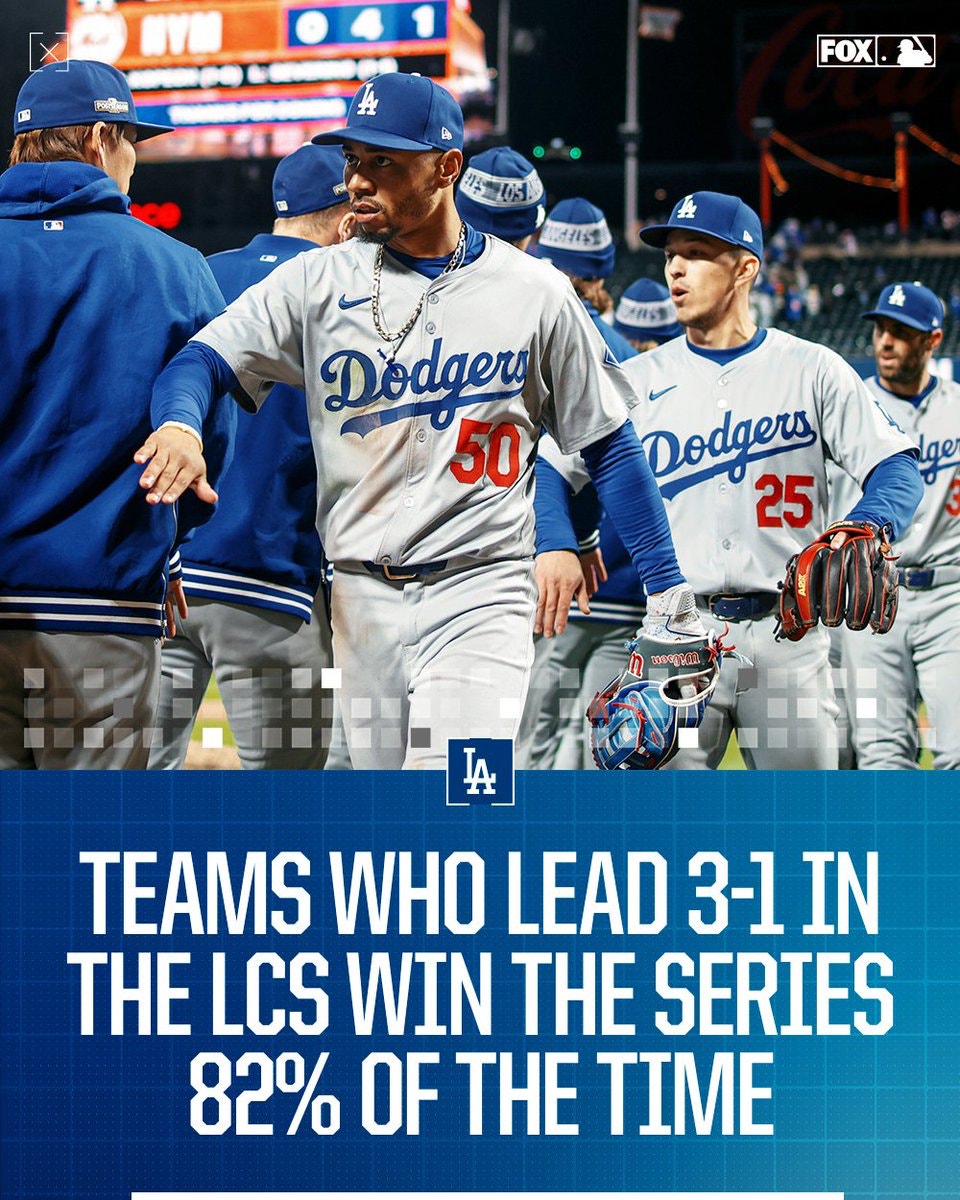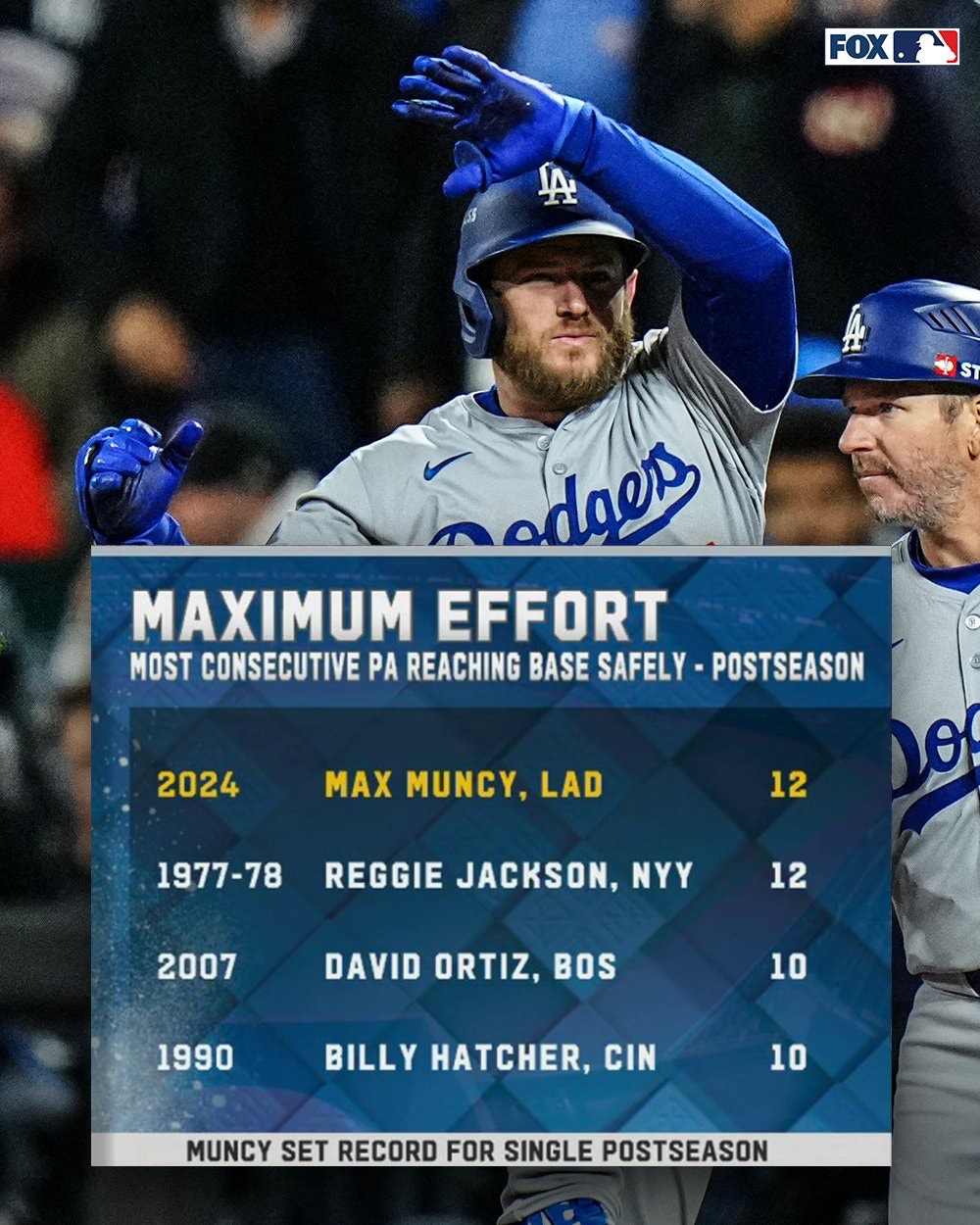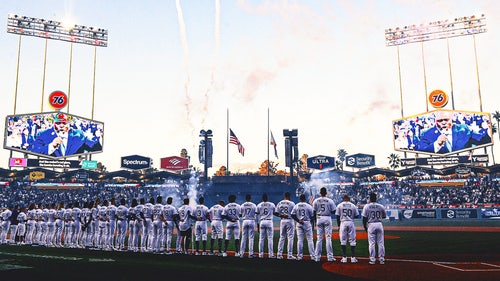
Has the Mets' magic run out? 3 takeaways from another Dodgers demolition
The faces in the crowd told the story. In the eighth inning Thursday night, many of the 43,882 fans at Citi Field found the exits. Those who remained were mostly staring straight ahead, stone-faced, seemingly in shock and disbelief, save for a moment when they offered a round of sarcastic cheers after their pitchers finally managed to retire Max Muncy.
The New York Mets, who had demonstrated so much resiliency and fortitude to get to the National League Championship Series, endured another thorough beatdown at the hands of the Los Angeles Dodgers, who followed up an 8-0 shellacking in Queens in Game 3 with a 10-2 thrashing at the same venue in Game 4.
Here are three takeaways as the Dodgers put the Mets on the brink and moved one win away from returning to the World Series for the first time since winning it all in 2020.
1. Has the Mets' magic run out?
The Mets' unyielding nature is what got them here. They were 11 games under .500 on June 2. From that point on, no one in baseball was better. A McDonald's mascot became a lasting image of an ascending squad and a changing vibe. As the team started winning, "OMG" became their anthem. They were not only good, they were fun.
Francisco Lindor ensured that aura would last into October with his game-winning homer that sent them to the playoffs on the final day of the regular season. When Pete Alonso followed in the wild-card series with the team down two runs, two outs away from elimination with a game-winning homer against one of the best closers in baseball, this seemed to be a team of destiny.
Until they ran into the Dodgers, who have outscored them by 21 runs through four games.
The Mets hit .265 with an .808 OPS with runners in scoring position during the regular season. In the NLCS, they're hitting .138 with a .541 OPS and seven RBIs in those situations. The Dodgers, meanwhile, are batting .333 with a .942 OPS and 24 RBIs with runners in scoring position.
In Game 4, the Mets had 10 at-bats with runners in scoring position and failed to record a hit in all of them. Their most flagrant offense came in the sixth inning, after Mookie Betts sent one of his four hits on the night out for a homer to increase the Dodgers' lead to five. The Mets answered back in the bottom half of the frame by loading the bases with no outs.
And then?
Jose Iglesias struck out. Jeff McNeil sent a fly ball to center field that might have been deep enough to score Brandon Nimmo if not for the plantar fasciitis that has hobbled the Mets outfielder throughout the series. He did not even try to score. When Jesse Winker's promising drive to right field died short of the warning track, it was all but over.
At the start of September, the Mets' odds to make the playoffs were just 29.6%. If they're looking for some motivation, that percentage is not far off from the odds of winning an LCS with three elimination games to go. Teams that have gone up 3-1 have won 82% of the time.
If the Mets can somehow find a way to dig out of the hole they've created here, it'll be their greatest trick yet in a season that seemed magical until this point.

2. The Mets' biggest advantage has not played out.
The tone for the series was set quickly when Jack Flaherty spun seven scoreless innings in the best start of his Dodgers tenure while Kodai Senga allowed as many runs (four) as outs recorded in Game 1. But considering Senga's lack of innings this year, that was the one matchup that seemed to be in the Dodgers' favor. The Mets were supposed to be the group with the starting pitching depth.
Sean Manaea demonstrated as much in Game 2, carving through the opposing lineup as the Mets foiled the Dodgers' bullpen game plans, ending Los Angeles pitchers' streak of 33 consecutive scoreless innings and flipping all the momentum with the series going to New York.
They had to feel good with Luis Severino and Jose Quintana going against Walker Buehler and Yoshinobu Yamamoto the next two nights.
Then the Dodgers annihilated them in both matchups, walking four times against Severino in Game 3 and four more times against Quintana in Game 4 as a disciplined L.A. lineup forced both Mets starters out early. It was a tough assignment for Quintana, who lives for chase, against a team unwilling to leave the strike zone.
Buehler and Yamamoto, meanwhile, combined to strike out 14 batters and allow two runs in 8.1 innings.
RELATED: Shohei Ohtani, Mookie Betts make Dodgers look unbeatable: 'You're facing Hall of Famers'
The Mets hadn't faced Yamamoto since April 19, when he allowed four runs (three earned) in six innings. He didn't throw any sliders in that meeting. In Game 4, he switched it up, throwing 14 of them, which represented a season high. The Mets whiffed on half of their 10 swings against the pitch, which was responsible for four of Yamamoto's eight strikeouts.
It was that same pitch that Yamamoto used to flummox Yankees hitters the last time he was in New York, when he tossed seven scoreless innings on June 7 in a game many referenced before the playoffs as an example of his ability to thrive with the lights at their brightest. There was some thought that the increased usage of his slider, however, might have also contributed to the shoulder issue that sidelined him for three months not long after that start against the Yankees. But there's no denying the effectiveness of the pitch and how it plays with the rest of his arsenal, and he clearly felt OK about it Thursday night.
After Buehler got 18 swings and misses in Game 3 — his highest total of the season — Yamamoto followed with 16, his third-highest total of the year, in just 4.1 innings of work. That's all the Dodgers needed before turning the game over to their pen, where they hold the clear advantage.
Mets manager Carlos Mendoza elected to save David Peterson despite Quintana's struggles Thursday. Now, with their season on the line, that's who they'll turn to in a do-or-die Game 5, perhaps with less of a leash than Mendoza was willing to grant Quintana as his night unraveled Thursday.

3. The Dodgers' MVPs thrived. But there's much more to this unrelenting lineup.
With one former MVP out of the lineup, two more took starring roles. With the Dodgers giving Freddie Freeman a night off to rest his injured ankle, the rest of the Dodgers' lineup picked up the slack.
"There was no excuse," manager Dave Roberts said. "We were expecting to win this game tonight."
It started from the top. Shohei Ohtani and Betts each reached base four times, with both going deep and the latter finishing a triple short of the cycle.
Ohtani entered the night 17-for-20 dating back to the end of the regular season with runners in scoring position, a record in the live-ball era. Strangely, it was a far different story with no one on base. He was 0-for-22 with the bases empty entering Thursday, when he immediately ended the peculiar skid by crushing a Quintana sinker 117.8 mph off the bat for a 422-foot home on the second pitch of the game.
He got on base three more times via walk, which meant pitching to another MVP, who often made them pay. Betts went 4-for-6 with 4 RBIs, bringing Ohtani home with a double in the fourth and a homer in the sixth.
There was nowhere for Mets' pitchers to rest. Tommy Edman had two hits and knocked in three runs, October legend Kiké Hernández added two more hits and Muncy reached base each of his first four times up, running his on-base streak to an MLB postseason record 12 straight plate appearances before striking out in the eighth.
"I wasn't even aware of that," Muncy told FOX Sports' Tom Verducci after the game. "That's pretty cool. The biggest thing, to me, is that means I'm getting on base for my teammates."

Up and down the lineup, the Dodgers have worked the Mets pitchers.
After walking five times in a Game 1 win in the NLDS, the Padres stopped gifting the Dodgers free passes, issuing no more than three walks in a game in any subsequent matchup. Against the Mets, the Dodgers have walked at least seven times every game. At the time of Betts' two-run double in the fourth inning, all four of their run-scoring hits had come with hitters ahead in the count.
The Dodgers have 16 hits and 24 RBIs with runners in scoring position in the NLCS. The other three teams in the LCS have combined for 11 hits and 20 RBIs with runners in scoring position.
"Right now, I'm still kind of enjoying it a little bit, but I'm already thinking about Peterson tomorrow," Roberts said. "Yeah, we've still got some work to do."
Rowan Kavner is an MLB writer for FOX Sports. He previously covered the L.A. Dodgers, LA Clippers and Dallas Cowboys. An LSU grad, Rowan was born in California, grew up in Texas, then moved back to the West Coast in 2014. Follow him on Twitter at @RowanKavner.
[Want great stories delivered right to your inbox? Create or log in to your FOX Sports account, follow leagues, teams and players to receive a personalized newsletter daily.]










